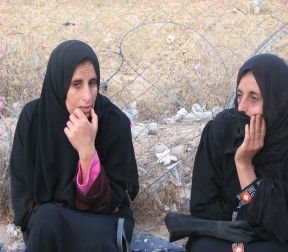Although many discussions within the Palestinian blogosphere are politics as usual, I've decided to change focus this week. Rather than government and Gaza and patriarchy, this week's roundup will tackle a subject of a different kind – the subject of women.
First up is the story of Hind Mohammed Eid, a young Egyptian girl who was raped and gave birth to a child, thus prompting a nationwide discussion on hijab as protection against such crimes (an article on this story is available in Arabic here) Improvisations: Arab Woman Progressive Voice discussed the case:
What is the connection between rape and veiling?
Well, the patriarchal logic goes like this: if a girl or a woman gets raped, it is because she was provocative. She was not fully covered and therefore it is her fault. So a 7-year- old girl who is raped is to blame. Or at least her parents are to blame because they left her exposed, thus tempting some man to rape her.
According to this logic, the girl must be veiled to protect the man from temptation. He is the victim.
Rapists rape girls as young as one year old. Shall we veil those temptresses too? Rapists rape men and boys. Why don't we veil those seducers as well?
Let us veil the whole universe to protect rapists from temptation. Veil the trees, veil the sea, and don't forget the air because all can be sensuous, all can be sensual, all can be dangerous.
The blogger's comments prompted a discussion of what could deter rape, if not the veil. Qwaider قويدر commented:
In this respect, I really appreciate the Jordanian law adding the death sentence for any underage rape (doesn't matter what the gender is) I think such strong consequence might work as a good deterrent against these matters.
James Stanhope responded:
In the U.S., both adult-on-adult rape and adult-on-adolescent rape (statutory rape) are decided by state criminal law, and, since these cases are nearly always decided by juries, it is not clear that the death sentence would act as a deterrent. In the U.S. state of Georgia, where I live, studies show that perpetrators of apparently both premeditated and impulsive violent crimes are not deterred by awareness of the punishment (including the death penalty) because these perpetrators expect not to be detected or apprehended.
Raising Yousuf, Unplugged: diary of a Palestinian mother is an extremely interesting blog which recently returned after a short hiatus. The blogger is a Palestinian mother who documents her life as such; in this post, she speaks of exiting Gaza and the difficulties it presents:
We spent 14 grueling hours on the crossing, along with thousands of other Palestinians, desperate to either leave or enter the Strip. Busload after busload, entire families and their children and spouses were clinging to the ceilings, crushed inside, or piled on top of the luggage in back. Some fainted. Others erupted in hysterics. Everyone had a reason to. There were mothers separated from their spouses. Students needing to return to college. The ill. The elderly. And those with nothing particularly remarkable to preface their reason for traveling with-it was their right, after all.
Our last stop this week is KABOBfest, where the talk is about the video for Hilary Duff's song Stranger. The blogger criticizes the video clip for being orientalist:
Hilary Duff's current music video “Stranger”, an Orientalist's wetdream come to life-that bizarre fusion of all Arabian, North African and Indian cultural elements into a unified vision of the overly-sexualized “Exotic East” that “strange” culture, has effectively hit the top of every pop chart and disturbed the fuck out of me.
Photo of women at the Rafah border crossing by Raising yousuf, Unplugged: diary of a Palestinian mother








2 comments